In 2016, as Lindsay McCormick was working as a reality television show producer and catching a different flight every other week, it bothered her that she was going through countless travel-sized tubes of toothpaste. As a former surf instructor, she had unsettling memories of the plastic that littered the ocean and beaches where she taught lessons, and she wanted to avoid contributing to the earth’s waste.
McCormick searched for alternatives to solve her toothpaste quandary, but everything on the market was packaged in plastic. Although she stumbled upon some plastic-free toothpaste tablets, the ingredients in them included harsh chemicals. And so, she started taking online chemistry courses on nights and weekends and talking to dentists and hygienists to formulate her own substitute.
It was a hobby—not a business. She simply wanted an effective toothpaste to combat her vegan lifestyle, as a high-carb diet tends to cause more cavities, and to reduce her own environmental footprint. Eventually, McCormick found the right combination of ingredients, bought a $1,000 hand-press tableting machine and figured out how to package the toothpaste in a glass jar.

Lindsay McCormick, founder/CEO of oral care brand Bite
“I saw this solution, and I thought it would have an incredibly niche appeal. I assumed it would be me, some of my hippie friends, my parents—who are just always going to be supportive—and maybe some of my TV producer colleagues wanting this stuff,” McCormick says. “I figured it would be an Etsy shop, and I’d also sell it on Shopify with the goal of just making my money back from the equipment I bought.”
McCormick, now the founder and CEO of an oral care brand called Bite, was wrong.
Like many other executives, she discovered that consumers are increasingly gravitating to businesses with a purpose. In fact, they’re even demanding accountability on issues like environmental impact and more racial and ethnic diversity in brands retailers carry or who is represented in C-suite offices.
This consumer cry is leading more merchants to highlight sustainable products or practices, center their mission on charitable giving, take a position in support of social causes like racial justice, and pledge to give people of color more access to management opportunities and wholesale partnerships. And retailers say these commitments are leading to positive social media mentions, lower customer acquisition costs, higher conversion rates, increased customer loyalty and upticks in revenue.
Consumers seek out companies aligned with their beliefs
There is “clear and strong” evidence that consumers evaluate companies through the lens of their own belief systems—a trend that has been growing over the last decade, according to Anjali Lai, senior analyst at research firm Forrester Inc.
“A company’s approach to moral, social and political values increasingly matters to its success,” she says. “[This is] giving rise to ‘values-based consumers:’ consumers who evaluate their purchases not just in terms of the direct benefits they’ll receive but also in context of the product’s [or] brand’s values around employment and manufacturing practices, political and social stances and commitment to other causes or beliefs.”
The shift in buying behavior is reflected in consumer research: 60% of U.S. consumers consider a brand’s values and environmental or social impact when making a purchase, according to Forrester’s 2020 Analytics Consumer Technographics Benchmark Survey of 142,480 online shoppers. This is up nearly 20 percentage points, from the 41% of U.S. online shoppers in 2018 that said they wanted to buy from a company that was closely associated with social, environmental or political issues, according to Forrester’s Consumer Energy Index Online Survey of 1,076 adults.
But committing to these causes is only half the battle. Retailers and brands also must authentically communicate their brand identity and initiatives to shoppers, according to analysts. Consumers rally around businesses that align with their values and open their wallets accordingly.
A Digital Commerce 360 analysis of 55 mission-driven retailers ranked in the 2020 Top 1000 reveals that values-oriented merchants performed better than the overall group of ecommerce leaders in 2019. Collectively, the group of 55 mission-driven brands increased web sales by 28.6% year over year, notably higher than the overall Top 1000, which grew online sales by 16.5%. The values retailers analyzed includes brands that use conflict-free diamonds, make shoes woven from recycled water bottles, employ Andean artisans to spin alpaca fabric or donate articles of clothing and mattresses to needy families each time a set number are purchased, among other causes.
How to build a brand that breeds consumer connection
It can take time for merchants to perfect their tone and identify the best way to communicate their good deeds. McCormick, for example, attributes a large part of Bite’s success to its educational content, which is a cornerstone of its marketing efforts.
Bite markets itself as an all-natural, 100% vegan, gluten-free, cruelty-free, zero-waste company. The retailer is subscription-oriented and sends customers a jar filled with four months’ worth of non-toxic tablets while subsequent refill orders arrive in a compostable pouch.
BiteToothpasteBits.com features cautionary statistics to spur consumers to buy like, “More than 1 billion plastic toothpaste tubes are thrown out each year with harsh chemical residues” and, “Every year, more than 50 Empire State Buildings’ worth of toothpaste tubes end up in landfills or oceans.” But McCormick says consumers demand more than that to buy into her sustainability proposition. Shoppers now heavily research brands and expect them to be transparent about their sourcing, packaging, hiring, ongoing improvement efforts and more.
“The content we create has to effectively describe our product. It’s a weird product. The tablets use different ingredients that are more expensive, and we have to explain why,” McCormick says. “If we weren’t good at communicating our message, we wouldn’t be getting anywhere.”
While McCormick declined to disclose Bite’s revenue, which Digital Commerce 360 estimates reached $13.4 million in 2020, she says the brand more than doubled its sales over 2019.
“I write these lengthy blog posts about why we choose the ingredients we choose, why we choose the packaging we choose—we weigh the pros and the cons for our audience to engage them in the conversation,” she adds. “We never try to come off perfect because there’s no perfect way to achieve sustainability. Instead, we articulate our reasoning for everything and the why behind our decisions, and once we give hard answers to consumers’ hard questions, they in turn become gigantic advocates for the company.”
Word of mouth is huge for Bite. Consumers get on board because they believe in what the brand is doing and feel comfortable vouching for the company to their friends and family, spreading the word, McCormick says. At $4.50, Bite’s customer acquisition costs are “so freaking low” when compared with other brands, which she says averages double digits, because its messaging and storytelling has laid the foundation and primed shoppers to think positively about the company, McCormick adds.
But the work it takes Bite and other value-focused retailers to tell their stories can be worth it, data suggests. 32% of consumers would pay more for a product from a brand they believe is committed to sustainability, according to an online survey of 2,000 shoppers commissioned by personalization platform Nosto in 2019. Additionally, 11% of consumers who shopped online during the five-day period last year from Thanksgiving to Cyber Monday selected a retailer because of its sustainable business practices, according to a Digital Commerce 360 and Bizrate Insights survey of 1,113 consumers in December.
Tackling sustainability, racial justice in marketing
Web-only produce purveyor Imperfect Foods is another retailer that has capitalized on increased consumer demands for sustainability. Like Bite, content has also been key to building the subscription company’s loyal customer base of more than 350,000 shoppers.
The founders learned how many fruits and vegetables grocers arbitrarily turned away for cosmetic reasons (i.e., odd shapes, scarring, cracking, over- or under-sized, etc.). It found perfectly healthy produce was left in fields, sent to animal feeds or sold for a loss. Co-founders Ben Simon and Benjamin Chesler launched Imperfect Foods in 2015 to reduce the 40% of unspoiled food thrown away each year in the U.S. and to make fresh, nutritious and affordable produce more accessible. Explaining that story and mission is crucial to the merchant’s success, says Reilly Brock, associate creative director at Imperfect Foods, No. 599 in the Top 1000.
Brock oversees storytelling and brand communication for the company. His six-person content branding team previously focused on writing recipes or posts with meal-planning tricks, grocery storage tips, leftover ideas and composting how-tos to combat food waste at home. But topics grew more serious as Black Lives Matter protests reached a fever pitch during the summer of 2020. Imperfect Food’s active online community began asking outright on social media and in email inquiries for the retailer’s corporate stance and urging the company not to stay neutral.

Reilly Brock, associate creative director of online grocer Imperfect Foods
“People expect and demand that of us and want us to live out our values every day,” Brock says. “That challenge really motivated us as a company—let’s dive into this earnestly, positively, passionately.”
Brock and his colleagues worked to educate themselves on the intersection of food justice and racial justice so they could speak to modern issues in a way that fit with the retailer’s mission and wrote messaging to share with its community.
“It turns out there’s a lot of overlap around food deserts and food apartheid, as well as which communities have access to healthy food options and which do not,” Brock says. “The learnings were sobering but motivating for us that there is more we can do.”
The term food desert is used to refer to a low-income, urban area without access to affordable or quality fresh food. Food apartheid speaks to the economic and racial segregation of healthy food options within the food system and the prevalence of fast food or small corner marts and absence of conventional grocers in certain geographic areas. And Brock’s team wanted to connect the dots for the retailer’s shoppers.
Brands amplify Black voices and join a national discussion
In June, Imperfect Foods sent an “Amplifying Black voices issue” email to its customers with the subject line “Black Lives Matter” with a heart emoji and took the opportunity to voice its support of the movement.
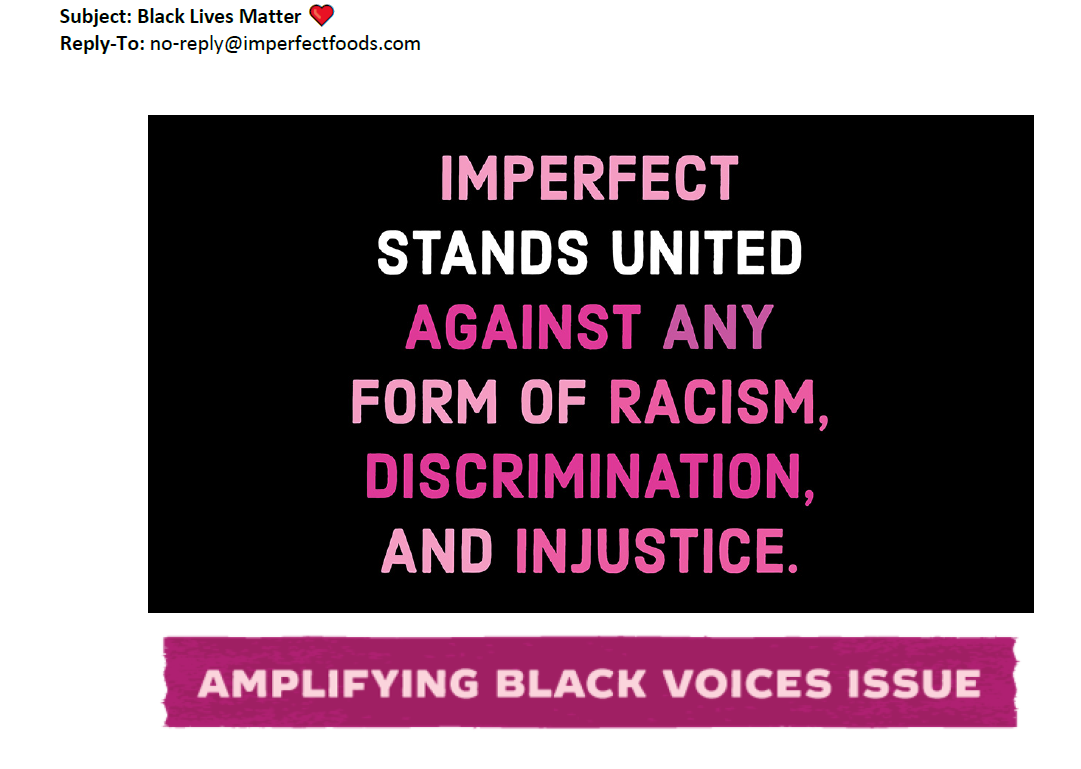
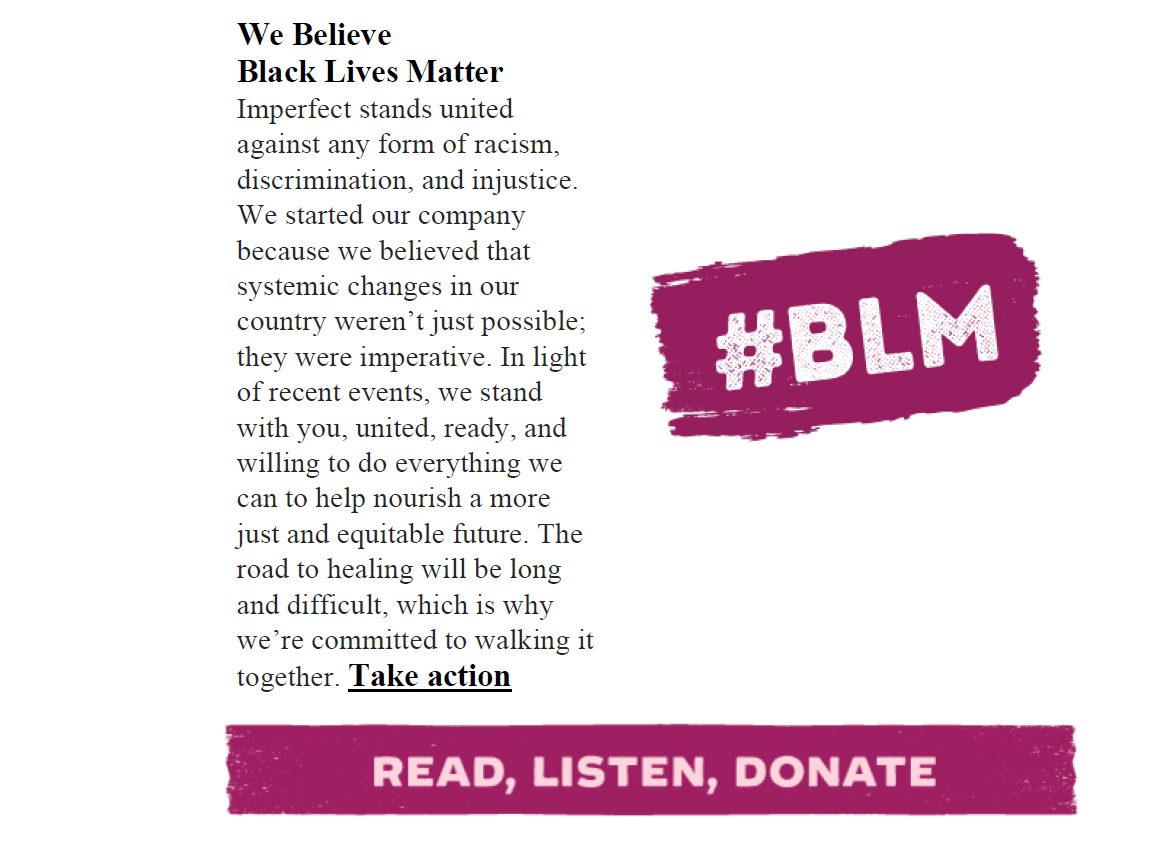
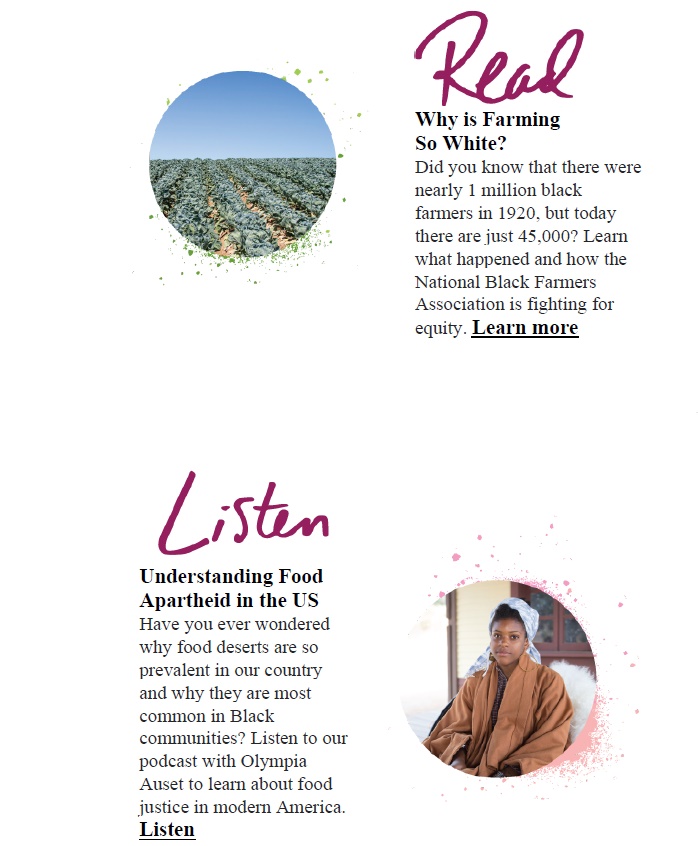
Web-only retailer Imperfect Foods sent its subscribers an email to voice support for the Black Lives Matter movement and to educate consumers on how they can help address racial disparities in access to healthy and affordable food.
The email linked to a news article about the lack of diversity in agriculture. The message also spotlighted Imperfect Foods’ most-downloaded podcast—a conversation about food deserts in Black communities with Olympia Auset, the Black founder of SÜPRMARKT, a low-cost, organic pop-up grocery store in South Central Los Angeles. Additionally, the email encouraged readers to donate to Appetite for Change, a Minneapolis-based organization that uses food to create health, wealth and social change in its neighborhood.
The message received tremendous positive feedback via social media and email, Brock says. The intent and sentiment of that campaign is what endears Imperfect Foods to shoppers, he says. Although some consumers are unaware of the brand’s mission and initially subscribe for the convenience of at-home produce delivery, they grow to love what the company stands for, he says. And Imperfect Foods says the proof is in the numbers.
CEO Philip Behn says Imperfect Foods increased average order value, order frequency and customer loyalty in 2020, according to Bloomberg. The retailer says it averaged triple-digit online sales growth over its first four years and expanded into dairy, meat and seafood in 2019. Imperfect Foods also benefitted from the surge in online grocery spending during the pandemic, again reaching triple-digit growth in 2020 and ending the year with a revenue run rate north of $500 million, according to the company.
Brands use cause-focused email marketing
Imperfect Foods is not alone in using the reach of email to address larger issues plaguing the country.
Values- or cause-focused email marketing from merchants jumped 68.6% year over year in 2020, according to data from email monitoring firm MailCharts. The company analyzed the use of more than a dozen mission-related keywords and phrases that appeared in email subject lines in both 2020 and 2019 across 750 popular online apparel, footwear, beauty, home and sporting goods retailers and brands for its findings.
Although the Black Lives Matter movement dates back to 2013, none of the retailers and brands tracked by MailCharts mentioned the phrase in email subject lines to consumers in 2019. But in 2020, after George Floyd, a Black man, died after a police officer knelt on his neck for nearly 9 minutes, widespread protests against police brutality sparked a resurgence of the movement. Retailers and brands began using email marketing to take a stand against systemic racism and to support equality and justice, and by the end of 2020, “Black Lives Matter” was mentioned in the subject lines of 142 campaigns.
Some merchants more generally disavowed racism and made various pledges. But others more specifically tackled current events in the wake of social unrest during the racial reckoning. Floyd and Breonna Taylor—a young Black woman who was shot and killed when police officers raided her apartment with a no-knock warrant while she and her boyfriend were sleeping—were named in 71 emails sent by MailCharts-tracked retailers and brands in 2020.
“Clearly, protests in 2020 compelled brands to address their stance on racial injustice and criminal justice reform,” says Brian Lai, insights manager at MailCharts.
Ecological-related keywords also were featured more prominently in emails to consumers in 2020, with a 59.3% overall uptick compared with 2019. Messages using the word “sustainability” surged 93.8% year over year while references to the “planet” swelled by 116.4% during the same period, according to MailCharts data. There also was an 80.0% increase in emails mentioning “environment.”
Additionally, retailers and brands used positive change- or charity-oriented phrases in emails 48.7% more frequently last year than in 2019, with “make a difference” appearing in 112.8% more messages in the same time frame.
Purpose-driven brand improves conversion rate
E.l.f. Cosmetics, a 16-year-old vegan and cruelty-free beauty brand, is no stranger to values-based shopping, but the company ramped up its commitment to its various missions during a tumultuous 2020 with a revamp of its ecommerce site.

Gayitri Budhraja, vice president of brand at e.l.f. Cosmetics
“Consumers absolutely crave brands that stand for something,” says Gayitri Budhraja, vice president of brand. “We are this inherently purpose-driven company, and the principles of inclusivity have always been completely rooted within our DNA. We became more intentional about shining a spotlight on our principles and prioritized messaging around the things we wanted to bring explosive visibility to. And that breeds connection with our consumers.”
In April 2020, the brand launched e.l.f. Cares, a section on its ecommerce site devoted to topics the company supports: LGBTQ+ pride, Black Lives Matter, COVID-19 prevention and relief, and vegan and cruelty-free products. The aim was to create an immersive experience for e.l.f. shoppers with explanatory and educational content as well as calls to action.
As diversity, equality and self-expression are pillar values for the brand, e.l.f. renewed its commitment to LGBTQ+ issues with the It Gets Better Project, an initiative to support and connect LGBTQ+ youth through storytelling. The section of the e.l.f. Cares page spotlights young people with photos and their answers to several questions: “When did you feel seen for being your true self?,” “What is something that someone told you that made a huge impact on your journey?” and “If you could face your younger self, what would you tell them?”
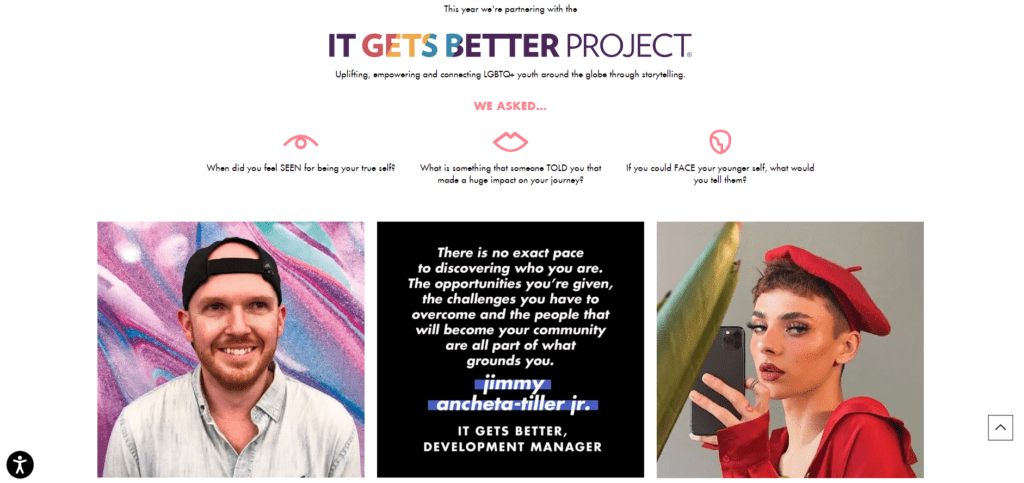
E.l.f. Cosmetics highlights its stance on LGBTQ+ issues on the brand’s ecommerce site by supporting the It Gets Better Project, an initiative to encourage self-expression and connect LGBTQ+ youth through storytelling.
Another e.l.f. Cares feature is focused on voicing support for Black Lives Matter with a firm message below.
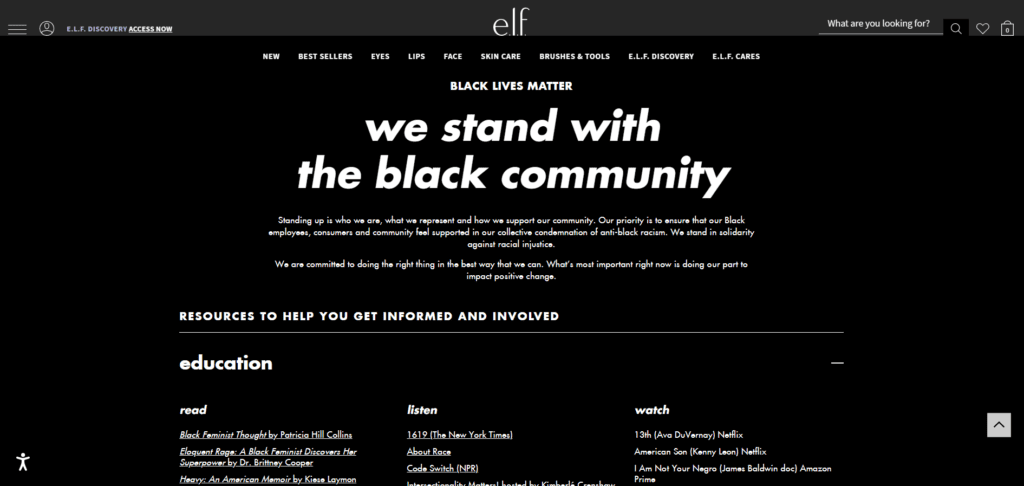
On the e.l.f. Cares page, the cosmetics brand offers a fully built out resource center to educate consumers on Black history and encourage allyship.
The section also includes a reading list and links to Black history-related movies, documentaries and podcasts. An action section links to social justice organizations where shoppers can donate, petitions to sign and numbers to text to join social movements. It also provides links to cause-oriented social media pages and guides to addressing racism with children.
Additionally, e.l.f. Cares includes thought-provoking letters from its chief financial officer Mandy Fields, a Black woman, and CEO Tarang Amin, an Indian immigrant born in Kenya, in response to the racially charged events over the summer and e.l.f.’s commitment to corporate change.
The page also outlines steps e.l.f. is taking to fight racial injustice, including forums on the topic with the e.l.f. executive team; sending weekly educational emails to employees from the CEO; shutting down ElfCosmetics.com for Blackout Tuesday, a day when some consumers refused to make purchases and some businesses ceased operations to protest racism and police brutality; recognizing Juneteenth as a company holiday; matching employee donations to organizations that fight anti-black racism; and making corporate donations to Color of Change, an Oakland-based civil rights advocacy group.
E.l.f., No. 1089 in the 2020 Next 1000, isn’t driving any paid traffic to the page, and the brand’s customer base is discovering the hub organically—often through searching for phrases like e.l.f plus “voting,” “pride” or “cruelty free,” Budhraja says. The keywords are an indication of the appetite consumers have for determining a retailer’s stance on causes or learning about value-based initiatives their favorite brands have launched, she says.
Consumers who visit the e.l.f. Cares hub spend 20% more time on the ecommerce site than those who don’t and have an 85% lower bounce rate, Budhraja says. What’s more, visitors to the e.l.f. Cares section have a 160% higher conversion rate than those who don’t engage with the page. Budhraja attributes this to consumers better understanding e.l.f.’s values and feel more aligned with its brand identity after visiting the section.
“The thing is—none of this can be manufactured. Consumers can see right through whether what you’re doing is performative or authentic,” Budhraja says. “It’s got to be in your fiber, and when it is, consumer sentiment is an immediate reaffirmation that you’re going down the right path.”
Favorite